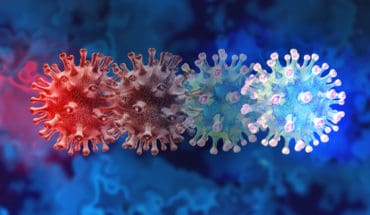Life presents us all with challenges. Most of us at some point will be struck by major traumas such as the sudden death of a loved one, a debilitating disease, or a natural disaster. What differentiates us is how we respond. In a new edition of their bestselling book, Resilience: The Science of Mastering Life’s Greatest Challenges, to be published by Cambridge University Press on 7th September, three of the world’s leading experts in trauma and resilience answer key questions such as:
- What helps people adapt to life’s most challenging situations?
- Why are some people better at bouncing back from adversity than others?
- Can resilience be learned, or is it innate?
- How can you build up your own resilience?
- How do you measure a person’s resiliency?
- What do we know about the science of resilience?
Combining cutting-edge scientific research with the personal stories of individuals who have survived some of the most traumatic events imaginable, including serious illness, near-death experiences, extreme violence and bullying, the book offers practical advice and actional steps which readers can take to bolster their resilience and improve their lives. The authors reveal ten ‘key resilience factors’ and show that those who exhibit the most resilience lean on one or more of the following practices. Resilient people:
- Confront their fears
- Maintain an optimistic but realistic outlook
- Seek, accept, and provide social support
- Imitate sturdy role models
- Rely on an inner moral compass
- Turn to religious or spiritual practices
- Attend to their health and well-being
- Remain curious, pushing themselves to learn new things
- Approach problems with flexibility and, at times, acceptance
- Find meaning and growth during and after their traumatic experiences
The book’s ten chapters focus on each of these factors in more detail and describe the latest behavioural and neuroscientific research underlying each of these elements.
Advance praise for Resilience
“An extraordinary manual that combines theory and practice, biology psychology, spirituality, social sciences to offer the complete science and knowledge of not just survival in times of suffering and tragedy but learning to thrive and find higher purpose. Our brains are created by genes but sculpted by experiences. This book covers both the science of epigenetics and neuroplasticity to show that our biological organism can be redesigned for joy and optimal integration of body, mind and spirit.” Deepak Chopra
“Sometimes it seems like trauma defines our age. This book reminds us that resilience is an equal and opposite force. Blending personal stories, cutting-edge science, and clinical insights, Resilience provides a comprehensive and rigorous tour of how we recover from trauma, whether that trauma is from a pandemic, a terrorist attack, or a personal tragedy. For anyone interested in a deep understanding of how humans can triumph over profound adversity, Resilience is an essential text.” Thomas Insel, former Director of US National Institute of Mental Health
About the authors
Steven M. Southwick, Yale University Medical School, Connecticut
Steven Southwick, MD, was Glenn H. Greenberg Professor Emeritus of Psychiatry, PTSD, and Resilience at Yale University Medical School and Medical Director Emeritus of the Clinical Neuroscience Division of the National Center for PTSD of the US Department of Veterans Affairs. Dr. Southwick was one of the world’s leading experts in psychological trauma and human resilience. His collaborations with Dr. Dennis Charney led to foundational discoveries about the biology and treatment of post-traumatic stress disorder, and factors that support resilience. His own resilience while fighting advanced prostate cancer for five years was an inspiration to his friends, colleagues, and family. He passed away on April 20, 2022, and this book, which he worked on through his final weeks, is dedicated to his life and legacy.
Dennis S. Charney, MD, is Anne and Joel Ehrenkranz Dean of the Icahn School of Medicine at Mount Sinai and President for Academic Affairs for the Mount Sinai Health System.
Dr. Charney is a world expert in the neurobiology of mood and anxiety disorders. He has made fundamental contributions to our understanding of the causes of anxiety, fear, and depression, and among his discoveries is use of ketamine for the treatment of depression – a major advance in the past fifty years of clinical care. He also focuses on understanding the psychology and biology of human resilience, which has included work with natural disaster survivors, combat veterans, and COVID-19 frontline healthcare workers. He has over 600 publications to his name, including books, chapters, and academic articles. In 2016 he was shot by a former co-worker and seriously wounded, a violent crime that tested his personal resilience.
Jonathan M. DePierro, Icahn School of Medicine at Mount Sinai, New York
Jonathan M. DePierro, PhD, is Associate Professor of Psychiatry at the Icahn School of Medicine at Mount Sinai and Associate Director of Mount Sinai’s Center for Stress, Resilience, and Personal Growth. Dr. DePierro, a clinical psychologist, is an expert in psychological resilience and the treatment of trauma-related mental health conditions. After many years working with individuals impacted by the 9/11 terrorist attacks, he now focuses on supporting the mental health needs of healthcare workers. Having experienced extensive bullying throughout his childhood, he learned important lessons about resilience that continue to inform his clinical and research work.
Resilience: The Science of Mastering Life’s Greatest Challenges (Third Edition) by Steven M. Southwick, Dennis S. Charney and Jonathan M. DePierro will be published by Cambridge University Press on 7th September 2023, price £12.99.
- Gut microbiome could delay onset of type 1 diabetes - 3rd April 2025
- The da Vinci 5 Robot Is Set To Transform Bariatric Care: - 31st March 2025
- Beyond money: the hidden drivers fuelling child food insecurity - 31st March 2025






